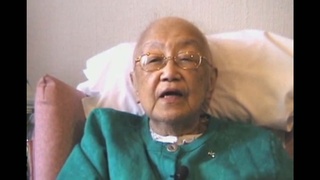Interviews
The Final Verdict
And we were worried, you know, until the time that Marilyn Hall Patel announced what, you know, what happened, and then also that she vindicated my case. But until that last minute, until she said that, nobody knew what was gonna happen, and they didn't say anything like, you know, "We're gonna win," because, well, I guess they feared the worst. It could have possibly gone the other way. So until she announced it, we just didn't know. ... Well, everybody was jumping up and down, you know, and crying, and I, I didn't hear it. And I just thought, "That must mean that we won." So, and then I talked to Dale, "Yeah." [Laughs] So Dale says, "Yeah." [Laughs] And Peter said that we did win it.
Date: May 14, 1996
Location: Washington, US
Interviewer: Lorraine Bannai, Tetsuden Kashima
Contributed by: Denshō: The Japanese American Legacy Project.





